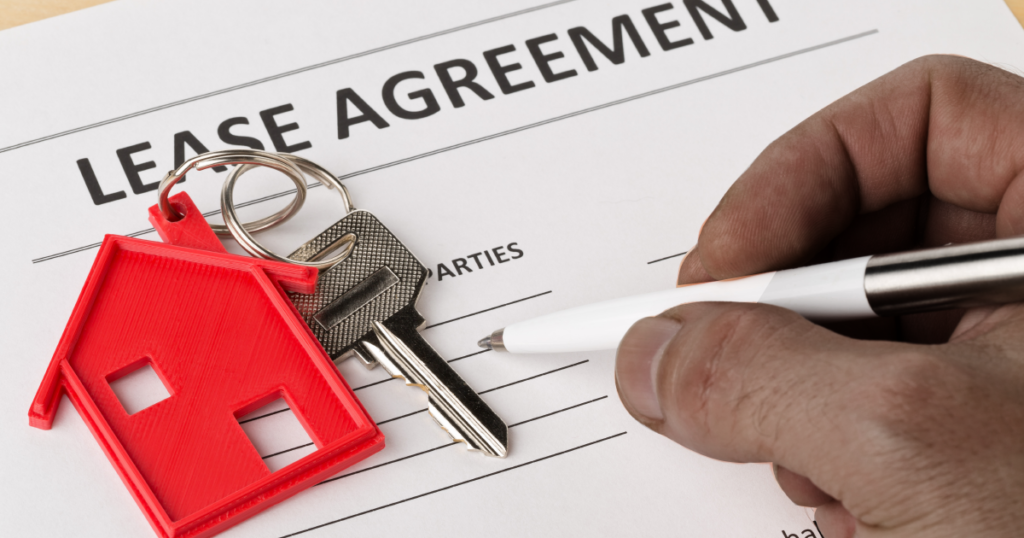A lot of property is held under lease in Kenya. The significance of a lease in the real estate market cannot be overstated, either in leasing commercial or residential properties. In this blog, we seek to explore the prerequisites and obligations of the parties to a lease.
READ ALSO: 10 Questions To Ask Before Signing a Lease Agreement
Table of Contents
What is a Lease?
Legally, a lease is a document creating an interest in land for a fixed period of time and usually in consideration of the payment of rent. In strictly legal terms it has been defined as a contract for the exclusive possession and profit of land for some determinate time. A lease, therefore, creates for a term of years, a leasehold relationship between a landlord (or lessor) and tenant (or lessee).
Essential Elements of a Valid Lease
- An occupier or lessee– Refers to the person who resides in the leased premises.
- Exclusive possession– The lessee must have an interest that entitles him to exclude all other persons, including the lessor from the premises. The exclusive possession must be transferred or granted by the proprietor, this encompasses the obligation of the lessor to the lessee.
- The period of a lease must be certain – The Land Act, 2012 permits an owner to lease land or part of it to any person for a definite term. It is advisable not to create leases that have clauses for perpetual renewal. It can be held to be void due to uncertainty of the period of the intended lease.
The considerations are either premium or rent. This is the price paid or promised in consideration of the grant of the lease.
The land or part thereof, as well as the parties, must be clearly defined or identified. If land is being leased, the document must have a plan or other description to identify it.
Distinctions Between a Lease and a License
Most lessors wonder if leases and licenses and substitutable. The answer is no.
With a lease, there is an exclusive possession of land by the lessee unlike with licenses. A license amounts to the creation of personal rights between the parties concerned. It does not create any interest in land and is not an instrument affecting land under the Land Registration Act, 2012. Licenses are mere permissions to stay on the land and cannot be assigned to a third party. They are not protected by law and are easily revocable by the issuance of reasonable notice. A situation that does not apply to leases that are separate estates in law and that must be terminated or forfeited according to the law.
Overall, they confer more rights than licenses such as quiet possession, non-derogation from grant, and repairs. Licenses are however contractual permission to use the premises.

Obligations Implied on a Lessor
- To give quiet and peaceful possession to the lessee.
- Not to derogate from the grant/lease as given to the lessee. There shouldn’t be use of adjacent property in a manner that would otherwise render the leased property unfit for purpose.
- To ensure that the premises are fitting for habitation.
- To ensure the property is fit for purpose. Where it can no longer be used for the purpose intended, one may terminate by giving one month’s notice.
- To pay all rates, taxes due, and outgoings except to the extent otherwise specified in the agreement.
Obligations Implied on a Lessee
- To pay rent on time and in the manner specified.
- To use the leased land in a sustainable manner and in accordance with the conditions in the lease.
- To yield up land and buildings in the same condition as they were when the term began. Exemptions for deterioration caused by reasonable wear and tear or natural disasters and acts of God.
- To keep all buildings comprise in a reasonable state of repair.
Types of Leases
Periodic Lease
The term of this lease is not specified and no provision is made for giving notice to terminate the tenancy. It is deemed to be for the period by reference to which rent is payable. There is usually no agreement in writing but there is occupation and payment of rent.
The lease may be terminated by giving notice whose length is not less than its period and shall expire on the day when the rent is payable.
Short Term Leases
These are leases of two (2) years or less without an option for renewal.
Such a lease may be made orally or in writing. However, a short-term lease is not a registrable interest in land. A lease can only be registered if the term is for more than 2 years.
Long Term Leases
These are used to grant title to apartment units or maisonettes although this practice will be phased out by the Sectional Properties Act, 2020. However, landowners should be careful as leases of over 21 years can confer title to land.
Registration of Leases and Effect of Non-Registration
The provisions governing registration of leases are:-
- All leases of more than 2 years should be registered.
- After registration of a lease that required consent of the lessor before registration, no further dealings will be registered without the same consent of the lessor.
The Land Registration Act, 2012 provides that any unregistered lease instruments shall be construed as mere contracts and not as an interest having passed.
Controlled Tenancies

A controlled tenancy is a type of commercial lease that comes about under the operation of the provisions of the Landlord and Tenant (Shops, Hotels and Catering Establishments) Act, (Cap 301, Laws of Kenya) (the “Act”).
The Act defines a “controlled tenancy” to mean a tenancy of a shop, hotel, or catering establishment which
(i) has not been reduced to writing
(ii) has been reduced into writing but is for less than 5 years or contains provision for termination, otherwise than for breach of covenant, within five years from the commencement thereof.
Class Agreements Exempt From Provisions of the Act
A tenancy is, under the Act, created by a lease, under-lease, agreement to lease, or operation of the law. If your lease is oral or is for less than 5 years or contains a break clause, it is automatically caught by the provisions of the Act. Even a tenancy created by operation of law or a sub-tenancy can be a controlled tenancy. Any agreement seeking to preclude the provisions of the Act in a controlled tenancy is void.
We advise lessors to safeguard their interests by having leases in place that are for more than 5 years with no termination clauses.
Class of Premises Exempt From Provisions of the Act?
The Act only exempts leases to which the Government or a County Government is a party, whether as landlord or as tenant, from being a controlled tenancy. The Act covers a wide range of premises which can be subject to controlled tenancy including:
- shops defined as retail or wholesale trade premises or business premises. The definition is wide enough to cover a whole raft of commercial premises.
- Catering establishments: These are premises where food or drink is supplied for consumption thereon.
- hotels premises for accommodation or accommodation and meals for up to five or more adult persons.
Disadvantages of Controlled Tenancy?
A controlled tenancy isn’t optimal for landlords/lessors because it contains terms onerous to the landlord and protects tenants/lessees in transactions. Some of the provisions and terms that are unfavorable to lessors/landlords as follows:
- Termination or alteration of the terms of the tenancy can only be subject to the Act’s provisions. This requires 2 months’ tenancy notices which may be contested before the Tribunal established under the Act.
- Tenants can apply for rent assessment or review or alteration of the terms of the tenancy and the tribunal has the power to decide how much rent is paid.
- Termination of the tenancy can only be based on the grounds listed under the Act and such termination can be challenged by reference to the Tribunal. The landlord can only levy distress for rent upon getting an order from the Tribunal.
- The powers of the Tribunal extend to varying the rent payable, permitting the levy of distress of rent, fixing the amount of service charge payable, and awarding tenants losses for termination of tenancy among other things.
READ ALSO: Know Your Basic Rights as a Tenant
Keys Things to Look at Before Entering Into a Lease
- Due diligence – undertake a search to confirm ownership of the land and whether the land has any encumbrances. It’s advisable where it includes buildings, to undertake a structural survey and have a status report of the condition of the property.
- Charges – ensure you understand how service charge and rents are billed and seek expert opinion on market rents.
- Security deposits should always be refunded after expiry.
Most of the lease clauses are negotiable if the lessee has bargaining power or standard form where the lessee doesn’t. A lease is not a mere formality and advise clients to seek legal assistance in the preparation of lease agreements. If you are looking to lease a property in Kenya, please reach out to Divinah Ongaki (d.ongaki@agema-analysts.com) or Elizabeth Omol (e.omol@agema-analysts.com) for more specific advice.



